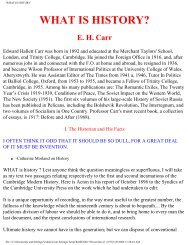The bronze age and the Celtic world - Universal History Library
The bronze age and the Celtic world - Universal History Library
The bronze age and the Celtic world - Universal History Library
You also want an ePaper? Increase the reach of your titles
YUMPU automatically turns print PDFs into web optimized ePapers that Google loves.
WE have<br />
Chapter X<br />
THE IRON SWORD<br />
seen that every type of sword, from Tj^pe A to Type E, has been<br />
found in <strong>the</strong> Hungarian plain, though Type B is not common <strong>the</strong>re. On<br />
<strong>the</strong> o<strong>the</strong>r h<strong>and</strong>. Types F <strong>and</strong> G are -entirely absent. It is unreasonable to<br />
suppose that, while <strong>the</strong> people of <strong>the</strong> mountain zone were developing more useful<br />
types of swords, <strong>the</strong> men of <strong>the</strong> plain were continuing for some centuries to use swords<br />
of T5^e E. Even were this <strong>the</strong> case we should expect to find that <strong>the</strong> swords of this<br />
type were vastly more numerous than those previously in use. But we have seen<br />
that only ten have been recorded for Hungary, whereas we have nineteen of Type D.<br />
<strong>The</strong>re remain only two possibilities : ei<strong>the</strong>r <strong>the</strong> people left <strong>the</strong> plain uninhabited, or<br />
<strong>the</strong>y had found some weapon more useful than <strong>the</strong> <strong>bronze</strong> sword.<br />
It is true, as we have seen, that steppe-l<strong>and</strong>s may be deserted in times of excessive<br />
drought, <strong>and</strong> <strong>the</strong>re is some reason for believing that such a dry period occurred somewhere<br />
about this time, for it was in 1350 or 1300 B.C. that we must place <strong>the</strong> Aramean<br />
invasion from <strong>the</strong> Arabian steppe, which was such a serious menace to Shalmaneser I.'<br />
But this drought, even could we be sure that it affected a small upl<strong>and</strong> steppe like that<br />
of Hungary, occurred somewhat too early for our purpose. <strong>The</strong>re is also <strong>the</strong> alternative<br />
<strong>the</strong>ory that too heavy a rainfall in <strong>the</strong> mountain regions might have made life<br />
unpleasant.* But this would have left a more marked effect upon <strong>the</strong> mountain zone<br />
than on <strong>the</strong> plain. <strong>The</strong>re may, indeed, have been an exodus, in fact, we shall find<br />
reason for beheving that this was so, but it is unlikely that <strong>the</strong> rich Hungarian plain<br />
was left long uninhabited. <strong>The</strong>re remains <strong>the</strong> alternative explanation, <strong>the</strong> discovery<br />
of a new weapon, <strong>and</strong> I hope to give reasons for believing that this is <strong>the</strong> true solution,<br />
<strong>and</strong> that <strong>the</strong> new weapon was <strong>the</strong> iron sword.<br />
Peake (1916) 1. 170 ; Myres (1911) 117. ' Myres (1913) 534, 535.<br />
117







